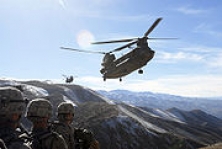 By Tracy Emblem
By Tracy Emblem
December 23, 2009 (Escondido) -- The Afghanistan "war" began on October 7, 2001, when our military launched "Operation Enduring Freedom." We were told the military operation was necessary to "neutralize" and "destroy" Al-Qaeda and Osama bin Laden. We have since acknowledged that the terrorism organization is constantly on the move connected by an intricate international web and cell phone links that do not reside permanently in any one country.
Soon after President Obama entered office, he sent 17,000 troops into Afghanistan bringing to total 57,000 troops deployed. In October, President Obama ordered another 13,000 non-combat troops deployed. Recently, the President explained that we must send another 30,000 of our young men and women to Afghanistan. According to Radio Free Liberty, NATO has 38,000 troops there and will likely deploy another 5,000.
Common sense tells us that it does not take over 140,000 troops to destroy the remaining 100 Al-Qaeda in Afghanistan.
It is not a question of "giving up" on terrorism. History shows that Americans will fight with a vengeance when our freedom is truly at stake and threatened. But the cost to the American taxpayer for both the Iraq and Afghanistan occupations has been tremendous in dollars spent. According to the Center for Defense Information, the estimated cost of the wars will reach $1.08 trillion by the end of fiscal year 2010.
Even more alarming is the emotional cost in families destroyed from people maimed and deaths. Over 4,352 U.S. personnel were killed during the Iraq occupation. In terms of lives lost in Afghanistan, we have had over 1,500 military fatalities. The true number of civilian deaths in Afghanistan is unknown. In February 2009, a British officer claimed that over 8,000 civilians have been killed as a result of military operations there. We cannot overlook that civilian deaths of loved ones breed more hatred and more terrorism.
Recently, the message changed to "this is a 'just' war" and "our military is in Afghanistan to stabilize their government." But why? Bernard Baruch, advisor to presidents during World Wars I and II, instinctively posed: "All wars are economic in origin."
Before the “war” began, Unocal signed an agreement to build a pipeline through Afghanistan crossing into Pakistan. Since invading Afghanistan, an assessment by the U.S. Geological Survey and the Government of Afghanistan Ministry of Mines and Industry discovered that Afghanistan's oil estimates were actually 18 times greater and the country had triple the natural gas resources previously estimated. The study was conducted courtesy of the U.S. Trade and Development Agency.
The Council on Foreign Relations on June 9, 2008, published an interview which stated: "More investment will bring Security to Afghanistan. The 'security' strategy places a very heavy reliance on the idea of privatization luring international and domestic partners to invest money. But the strategy acknowledges for investors to invest in Afghanistan, security needs to first be achieved."
No one questions that it is honorable to have a desired goal to finish a job for the world's safety, but we have to ask our leaders for truthful and complete explanations because it takes vast emotional and economic tolls for our military to be engaged in warfare.
We were told and blindly accepted that there were "weapons of mass destruction" in Iraq and it was imperative to invade with our military. This turned out to be false. Like Iraq, there is absolutely no guarantee our troops will be withdrawn from Afghanistan until the job is completed, and that task could take even longer than the six years we spent in Iraq.
The classical book "The Art of War" recounts this wisdom: "No country has ever profited from protracted warfare." We've been in protracted warfare for over eight years. How much more will it cost the American taxpayers - another $130 billion?
Considering Bernard Baruch's premise, and the Council on Foreign Relation's statements, our taxpayers may be involuntary participants in funding the security and infrastructure necessary for Afghanistan's economic development.
It’s time we demand investing our taxpayer dollars in our own communities at home and in American jobs, America's crumbling infrastructure, and new technology. Its time to ask our representatives and federal government critical questions about who benefits from the development in Afghanistan.
Tracy Emblem is an attorney and a Democratic candidate for U.S. Congress in California's 50th District.
The opinions expressed in this editorial reflect the views of the author and do not necessarily reflect the views of East County Magazine. If you wish to submit an editorial for consideration, contact editor@eastcountymagazine.org.








Recent comments